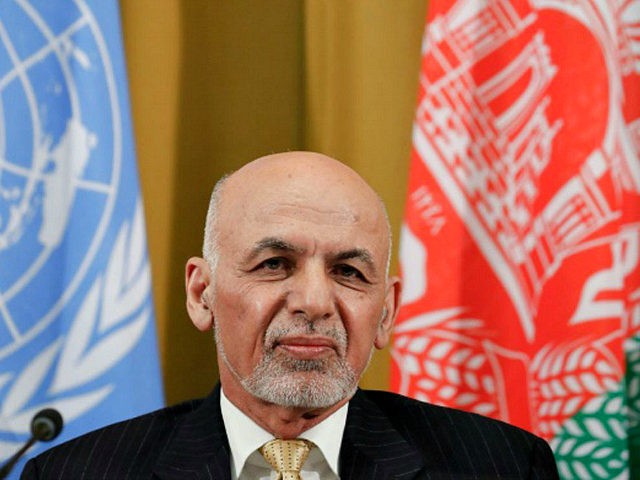The prospects for the peace deal brokered between the United States and the Taliban looked grim less than 24 hours after it was announced, as Afghan President Ashraf Ghani balked at releasing 5,000 Taliban prisoners as specified in the agreement, and the Taliban responded by announcing it would resume “operations” against the Afghan government.
Ghani said on Sunday he has not agreed to release any Taliban prisoners. The peace deal called for 1,000 government security forces held by the Taliban to be released in exchange for 5,000 Taliban fighters imprisoned by the government.
“The release of prisoners is not the United States authority, but it is the authority of the government of Afghanistan,” Ghani declared.
The Taliban responded that it would not engage in talks with the Afghan government scheduled for next week unless the prisoner swap was completed. The Taliban generally refuses to recognize the legitimacy of Ghani’s government, treating it as a puppet of the United States. When officials from Kabul traveled to Qatar over the weekend to discuss the prisoner exchange, Taliban negotiators refused to meet with them.
“We have decided the issue of our 5,000 prisoners with the Americans. They have promised in the agreement that those prisoners will be released before the start of the intra-Afghan negotiations. For us, this issue is settled,” said senior Taliban negotiator Khairullah Khairkhwah.
“We are fully ready for the intra-Afghan talks, but we are waiting for the release of our 5,000 prisoners. If our 5,000 prisoners – 100 or 200 more or less does not matter – do not get released there will be no intra-Afghan talks,” Taliban spokesman Zabihullah Mujahid told Reuters on Monday.
Zabihullah said the seven-day “reduction in violence” agreement that was a precondition for the peace deal with the United States was now over, and the Taliban could resume attacks against Afghan troops and civilians at any moment.
“As we are receiving reports that people are enjoying the reduction in violence, we don’t want to spoil their happiness, but it does not mean that we will not take our normal military activities back to the level that we were before. It could be any time, it could be after an hour, tonight, tomorrow or the day after,” he said.
An announcement from the Taliban on Monday said that its “operations” would resume shortly. Within an hour, an explosion that killed three people and wounded 11 others was reported in eastern Afghanistan. Local police said a motorcycle loaded with explosives was detonated near a soccer field in the Nadir Shah Kot district.
The full effect of these developments on the U.S.-Taliban peace deal remains to be seen. Technically the Taliban’s hostile rhetoric and actions are directed at the Afghan government, not American forces. There were bombing attacks during the seven-day “truce,” although the Taliban denied involvement and suggested the unknown perpetrators were “trying to create distrust.”
Secretary of Defense Mark Esper on Saturday promised the U.S. would forcefully respond to any Taliban violation of the peace deal. Esper met with Ghani before the U.S. signed the Taliban peace deal and described him as supportive of the arrangement. There was no immediate response from the Trump administration to Monday morning’s developments.
Secretary of State Mike Pompeo said in a CBS News interview on Sunday that the peace deal included “a detailed set of commitments that the Taliban have made about the levels of violence that can occur, the nature of what’s got to take place.”
“It’s going to be rocky and bumpy,” Pompeo said. “No one – no one – is under any false illusion that this won’t be a difficult conversation. But that conversation for the first time in almost two decades will be among the Afghan people, and that’s the appropriate place for that conversation to take place.”
“We’re prepared to do what it takes to ensure that we keep America safe. We’ve asked everyone there to reduce the levels of violence, both the Afghan National Security Forces and the Taliban,” he added.
Pompeo, the first U.S. cabinet official to meet directly with a member of the Taliban, stressed that one of the most important American interests in the deal was getting the Taliban to renounce international terrorism and agree not to harbor groups like al-Qaeda in the future.
He said the deal would be based on “actions,” not “trust.”
“This deal doesn’t depend upon trusting anyone. It has a deep, complex, well-thought-out, multi-month-negotiated verification complex and mechanism by which we can observe and hold every member of the agreement accountable. We’ll do that. It’s not about trust. It’s about what happens on the ground, not only yesterday which was an important day, but in the days that follow,” he said.
Pompeo was aware of Afghan President Ghani’s reluctance to release 5,000 Taliban prisoners, but he did not see that as an insurmountable obstacle to the “inclusive process” initiated by the peace deal. He mentioned that Ghani’s government made a “commitment” to the deal, but did not specify the details of that commitment.

COMMENTS
Please let us know if you're having issues with commenting.